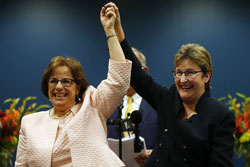Same-sex marriage is returning to the Supreme Court quietly, for now, but soon enough with a shout.
The court’s nine justices will meet privately on Monday to consider hundreds of petitions for the upcoming new term. The most anticipated of them would test whether the Constitution encompasses a right of same-sex couples to marry.
“It’s inevitable at this point that the court will recognize marriage equality,” said David Cole, a liberal professor at Georgetown University Law Center. “The question is when.”
In truth, other key questions include who, which, how and how far?
Specifically: Who will argue the cases and, perhaps, reap the glory? Which state bans, in particular, will be the focus? How will the court reason in its final decision, and how far will the decision-making extend?
During their “long conference,” which precedes the Oct. 6 start of the court’s new term, the justices will consider seven petitions involving state bans on same-sex marriage. Lower appellate courts struck down the marriage restrictions in Utah, Virginia, Oklahoma, Indiana and Wisconsin.
While there’s not yet the circuit split that reliably invites Supreme Court action, and a circuit court is still considering bans in Kentucky, Michigan, Ohio and Tennessee, many expect the high court to act.
“You’ve got a chaotic legal situation,” said attorney Michael Carvin, who has argued on behalf of conservative causes before the Supreme Court. “I think they’ll take the case as a fish-or-cut-bait time.”
At least four justices must agree for a petition to be granted, and Justice Ruth Bader Ginsburg, a same-sex marriage supporter, cautioned recently that “there is no rush” yet.
In theory, the justices could announce this week if they will hear the same-sex marriage argument. More likely, they could take several weeks while they get everything lined up.
At least two cases could be selected for back-to-back oral arguments sometime next year. Several issues are in play as the court weighs the different cases.
Virginia, for example, bans same-sex marriages conducted within the state, and prohibits the recognition of same-sex marriages conducted in other states. These two provisions present distinct arguments, making the Virginia case from the 4th U.S. Circuit Court of Appeals legally appealing.
Some of the Virginia same-sex couples are represented by the right-left dream team of Theodore Olson and David Boies, who also represented the gay couples challenging California’s Proposition 8 ban on same-sex marriage.
Virginia’s Democratic attorney general, though, is not defending the state’s ban. This could muddy the case. Last year, the Supreme Court sidestepped the fundamental constitutional questions in the challenge to California’s Proposition 8, instead deciding the case on technical grounds of who had the authority to defend the measure.
In contrast, Utah Attorney General Sean Reyes is vigorously defending Utah’s same-sex marriage ban, adopted in 2004 as a constitutional amendment approved by 66 percent of voters, giving that case some extra mileage as a vehicle.
“All Utah citizens will benefit when the Supreme Court provides clear finality on the important issue of state authority to define marriage,” Reyes said last month.
If the court wants to streamline the issue further, it could take up the Oklahoma case, which Stanford Law School Professor Jeffrey Fisher notes in a legal brief deals solely with an in-state marriage ban and not with the distinct question of recognizing marriages from other states.
Lower appellate courts have reasoned in different ways to strike down same-sex marriage bans, giving the Supreme Court several possibilities to consider. Though the result might be the same, the long-term legal fallout could differ depending on whether the high court emphasizes a due process fundamental right to marry, an equal protection freedom from discrimination or some other basis.
Famously a swing vote, Justice Anthony Kennedy authored a 1996 opinion striking down a Colorado measure that blocked legal protections based on sexual orientation. He wrote a 2003 decision striking down a Texas anti-sodomy law, and last year he crafted the decision striking down Defense of Marriage Act provisions that kept same-sex couples from obtaining federal marriage benefits.
“This places same-sex couples in an unstable position of being in a second-tier marriage,” Kennedy wrote of the federal law. “The differentiation demeans the couple, whose moral and sexual choices the Constitution protects.”
Chief Justice John Roberts, though few predict he will vote for same-sex marriage rights, nonetheless has kept his options open. Last year, tellingly, Roberts declined to join part of a scathing dissent in which Justice Antonin Scalia explicitly dismantled arguments of same-sex marriage proponents.
“We may in the future have to resolve challenges to state marriage definitions affecting same-sex couples,” Roberts conceded, but “that issue, however, is not before us in this case.”
On Monday, the future that Roberts foretold could come several steps closer.
IMAGE TAKEN from nypost.com




